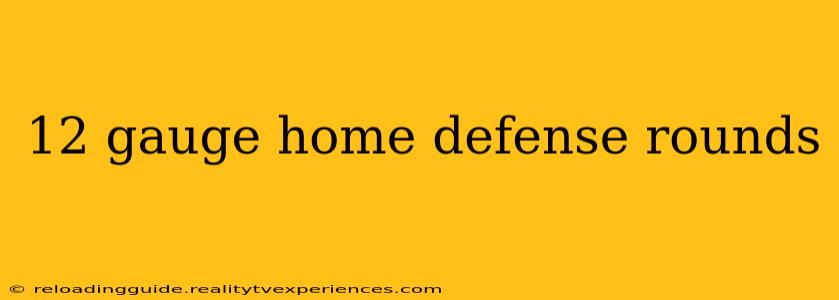Choosing the right ammunition for home defense is a critical decision, and for 12-gauge shotgun owners, that selection process can feel overwhelming. This guide dives deep into the world of 12 gauge home defense rounds, helping you understand the key factors to consider and make an informed choice for your specific needs and situation. We'll explore different shell types, their pros and cons, and ultimately empower you to select the best ammunition for protecting your home and family.
Understanding the Variables: What Makes a Good Home Defense Round?
Before we jump into specific 12 gauge loads, let's clarify what constitutes effective home defense ammunition. Several key factors come into play:
- Stopping Power: This refers to the round's ability to immediately incapacitate a threat. Over-penetration is a serious concern, so a balance between stopping power and manageable penetration is crucial.
- Reduced Risk of Over-Penetration: Your home's construction, surrounding environment, and the potential for collateral damage must be carefully considered. Rounds that limit over-penetration are paramount for safety.
- Pattern Density and Spread: A tight pattern at close range is generally preferred for home defense, maximizing the impact of the shot. However, excessive spread at longer ranges can reduce effectiveness.
- Recoil: Especially in stressful situations, manageable recoil is vital for follow-up shots and maintaining accuracy. This is particularly relevant for those less experienced with shotguns.
- Reliability: Your ammunition needs to function flawlessly every time, without fail.
Popular 12 Gauge Home Defense Loads: A Detailed Look
Several types of 12 gauge rounds are commonly used for home defense. Let's examine their strengths and weaknesses:
1. Buckshot: The Classic Choice
Buckshot loads contain multiple lead or other metal pellets, offering a potent stopping power at close range. However, over-penetration remains a significant concern with buckshot, especially with larger pellet sizes (like 00 buck). Smaller pellet sizes like #4 buck offer better control over penetration, but may sacrifice stopping power.
- Pros: High stopping power at close range, readily available.
- Cons: Significant risk of over-penetration, more recoil than other options.
2. Birdshot: A Controversial Option
Birdshot, typically used for hunting small game, is often deemed inadequate for home defense due to its relatively low stopping power. While it offers significantly reduced penetration, it's generally not considered a reliable option for stopping a determined attacker.
- Pros: Minimal risk of over-penetration.
- Cons: Low stopping power, unsuitable for serious home defense scenarios.
3. Slugs: Powerful but Risky
Slugs are single projectiles, offering high stopping power and deep penetration. However, this high penetration poses significant risks in densely populated areas or homes with thin walls. Their accuracy is also generally better at longer ranges than buckshot.
- Pros: Extremely high stopping power, good accuracy.
- Cons: Very high risk of over-penetration, significant recoil.
4. Less-Lethal Options: Rubber or Bean Bag Rounds
Less-lethal options, such as rubber or bean bag rounds, are designed to incapacitate without causing serious injury. However, their effectiveness is debated and they may not always be sufficient to neutralize a threat. Their reduced stopping power might necessitate additional shots and might not be suitable for every situation.
- Pros: Reduced risk of injury or death.
- Cons: Lower stopping power, effectiveness varies greatly.
Making the Right Choice for Your Home
The optimal 12 gauge home defense round depends entirely on your specific circumstances. Consider the following:
- Your home's construction: If you live in a densely populated area or have thin walls, prioritize reduced penetration rounds, such as #4 buckshot or less-lethal options.
- Your experience with firearms: If you're a novice, a lower-recoil option might be safer and allow for more controlled shots.
- Your comfort level: Choose an ammunition type you are comfortable and confident using in a stressful situation.
Conclusion: Preparation and Training are Key
Selecting the right 12 gauge home defense round is crucial, but equally important is proper training and preparation. Regular practice with your shotgun and chosen ammunition is essential to ensure you can handle it effectively and safely under pressure. Remember to always prioritize safety, understand your local laws, and consult with law enforcement or experienced firearms instructors before making your decision. This guide provides information, but should not be substituted for professional guidance.

